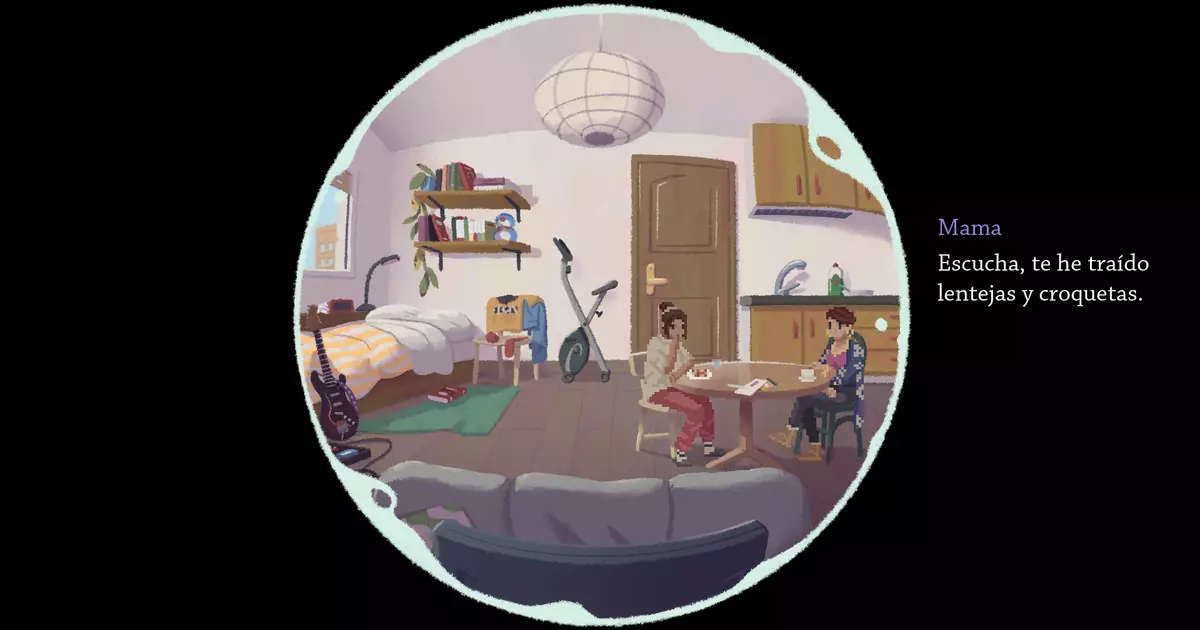“Vendrán Las Aves” — or “The Birds Will Come” — stands as a poignant entry into the digital landscape, designed to offer solace in the face of burnout and emotional exhaustion. Co-created by the ingenious minds of Francisco Riolobos, Chuso Montero, and Deconstructeam, this game has emerged from Valencia, revered for previous works such as “The Red String Club” and “The Cosmic Wheel Sisterhood.” Released as part of a game jam, it encapsulates feelings of melancholy and hope, inviting players into a simplistic yet deeply engaged narrative experience.
In this compact yet profound simulator, the player walks in the shoes of an individual who has recently severed ties with an unfulfilling job while navigating the weary aftermath of that decision. The disorienting blend of impulsiveness leads this character to purchase a guitar, an emblem of hope that soon transforms into yet another weight on their shoulders. Set within the confines of a one-room apartment, presented through the metaphorical lens of a snow globe, the game not only provides a microcosm for our protagonist’s life but also engages deeply with feelings of isolation and stunted creativity.
At the heart of “Vendrán Las Aves” is a strategic resource allocation system. Each day, the player is tasked with attempting to manage their protagonist’s limited energy through monotonous daily chores and modest indulgences. Activities such as eating or watching TV compete against more constructive pursuits like practicing the guitar or exercising, presenting an ongoing tug-of-war against apathy. The beauty of gameplay lies in its relatable mechanics; energy isn’t infinite, and choices bear weight, mirroring the athletes’ dilemma of balance between self-care and societal pressures.
While this simplistic approach might initially seem reductive, it resonates deeply with many, especially those familiar with dealing with burnout. Players often find themselves identifying with the character’s struggle to find motivation while remaining tethered to everyday responsibilities. The delicate choreography of deciding how to allocate precious energy points means that even the most mundane tasks can feel monumental, a reality many facing burnout often endure.
An undercurrent throughout “Vendrán Las Aves” is the pivotal theme of community support. The narrative illustrates that while the protagonist is at a low point, the presence and assistance of loved ones, such as a mother’s visit with homemade food, can significantly lighten the emotional burden. This aspect serves as a gentle reminder that accepting help from others is not a sign of weakness but rather an essential facet of healing and recovery.
The commentary on the character’s prior employment adds further depth to the storyline; while they may grapple with personal issues, hinting at systemic inadequacies provides a broader context. This subtle note elevates the game from merely an individual’s tale of struggle to a reflection on the wider implications of toxicity in work environments and the resultant psychological toll. In this way, “Vendrán Las Aves” fosters a compassionate narrative that taps into a collective experience of burnout, rather than confining it solely to personal adversity.
Having navigated the narrative, many players might resonate with the duality of emptiness and the desire for fulfillment embodied by the character. The game encapsulates the struggle to find equilibrium amid the chaos of modern life, further edifying our understanding of burnout as a multifaceted condition rooted in both personal and social dimensions. Despite moments of despair, the game offers a semblance of hope, albeit without delivering a neat resolution to the character’s struggles, reflecting the ongoing nature of recovery itself.
While “Vendrán Las Aves” engages meaningfully with the theme of mental health, it also navigates the potential pitfalls of comparison to games like Zoe Quinn’s “Depression Quest.” Both titles provide valuable narratives surrounding mental health challenges, but Krieg’s unwavering commitment to portraying authenticity merits its own exploration.
“Vendrán Las Aves” serves not only as a gameplay experience but as a gentle nudge toward introspection and understanding, bridging the gap between the virtual and real-world experiences of burnout. Its gracefully handled narrative encourages players to acknowledge their struggles while simultaneously seeking communal support, creating a conversation around mental well-being that is essential in today’s demanding world.

